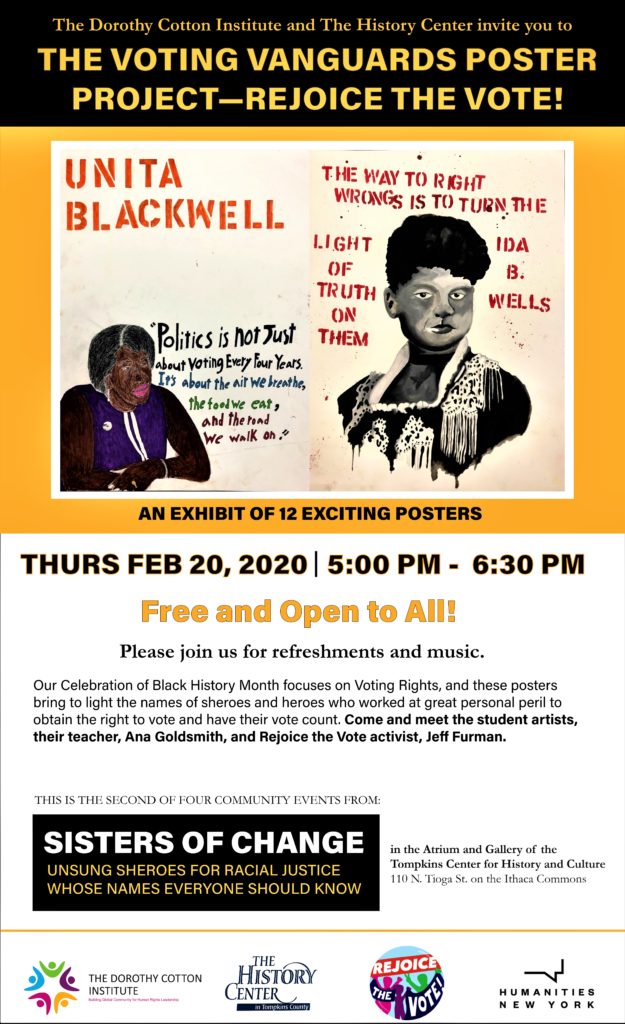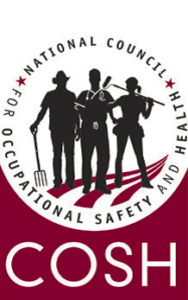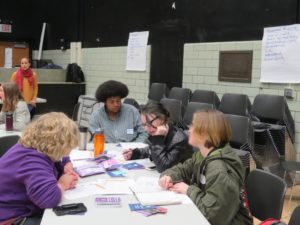
–See the Sisters of Change exhibit in the Atrium Tower, and The Voting Vanguards show in the Gallery
–Meet the student artists, their teacher, Ms. Ana Goldsmith, and Rejoice the Vote! activist, Jeff Furman
–Hear about the Voting Vanguards–the American sheroes and heroes who fought for our voting rights
–Hear about the Constitutional Amendments and Voting Rights Act: the foundation for our voting rights.
–Register to Vote on the spot if you haven’t already!
–Share your own answers: Why do you vote? Why will you vote? Why do you want your family to vote?
–Free & Open to all, especially students, educators and families.
–Enjoy refreshments and Ben & Jerry’s Ice Cream!

Led by Kirby Edmonds and Laura Branca, eight local teens have been trained to lead important workshops for young employees
The Midstate COSH trainers will train fellow teenagers and youth in these areas:
Introduction to Workplace Rights Under OSHA
Sexual Harassment
Workplace Violence
Health & Safety Hazards
Solutions at Work
If you are interested in having a teen-led workshop (usually 2-3 hours long) on these issues, please contact Antonio Triana <r10triana@gmail.com> or Midstate COSH <midstatecosh@gmail.com>
| ➜ Job opportunities are available with the Midstate Council for Occupational Safety and Health this Summer 2017.
|
|||
On March 13, the Dorothy Cotton Institute presented an interactive half-day training workshop on understanding the human rights framework, for students from two high schools–Lehman Alternative Community School, and New Roots Charter School. The half-day workshop was hosted by LACS in their terrific theater space. DCI Senior Fellows Kirby Edmonds and Laura Branca designed and led the training.
A highly committed team of educators who are champions for equity and inclusion in their schools worked together to organize, find a time and space, and encourage their students to attend.
 Many of the youth who attended the workshop are already involved working for justice and positive change in their schools and in their lives. The purpose of this workshop was to encourage them to use their understanding of human rights for creative self-expression, scholarship, and positive action to end discrimination and respect human dignity. The DCI is invited some youth to design a panel at The History Center about their work for social justice, date TBD.
Many of the youth who attended the workshop are already involved working for justice and positive change in their schools and in their lives. The purpose of this workshop was to encourage them to use their understanding of human rights for creative self-expression, scholarship, and positive action to end discrimination and respect human dignity. The DCI is invited some youth to design a panel at The History Center about their work for social justice, date TBD.
Human Rights are Universal, which means that they belong to all people, everywhere. Yet it’s surprising how many people do not know very much about array of rights and responsibilities that our nation and hundreds of other nation states across the globe have made a commitment to protect and uphold.
The Right to Know Our Rights: The Declaration of Human Rights Education and Training says that first and foremost is our right to know our rights, and that all people, everywhere, are entitled to human rights education. The Dorothy Cotton Institute is very pleased to offer young people the opportunity to examine their experience through the lens of human rights and responsibilities.
If you are interested in future human rights workshops for young people, educators or activists, please contact Kirby Edmonds at tfckirby@aol.com, or 607-277-3401.
 Youth Leadership Development Work
Youth Leadership Development WorkThe DCI Youth leadership development program:
-participate in the global human rights movement
-develop their leadership skills
-develop relationships with young people from around the globe through a network of young human rights
leaders and activists.
DCI’s youth education and leadership development work builds on the following opportunities:
Human Rights Education
Youth Leadership Development Workshops
Field Trips
Youth Gatherings
DCI, working with other human rights education organizations, develops and promotes the distribution of human rights core curricula in public schools. DCI also, again in partnership with other human rights educators, develops and provides training for public school teachers in the use of human rights core curricula.
Youth Leadership Development:
DCI will through its fellowship program and in partnership with community youth programs (e.g. community –based programs, religious institutions and schools) provides:
Anticipated impact and outcomes:
The Dorothy Cotton Institute’s Fellowship Program supports the efforts of human rights activists in their communities, helps close the gap between their work and scholarly research, and establishes the core of a think and do tank to develop effective strategies, identify projects and areas of research for DCI fellows, and contribute to a growing knowledge base.
The DCI’s Fellowship Program builds on the following opportunities:
Identifying and providing support and networking opportunities to practitioners and scholars working in the area of civil and human rights is the core function of the DCI fellowship program.
Fellows may be:
-How to assess where a nation or organization is on the continuum of respect and protection of human rights.
-Which public education practices are most likely to produce a citizenry that understands human rights and is
able to meet the responsibilities of exercising their rights and protecting the rights of others.
The fellowship program provides a combination of financial, programmatic, administrative and/or intellectual support to these fellows through stipends, grants, scholarships, mentoring, training, seminars and access to its network of practitioners, artists, performing artist and scholars. Their work will then be included in ongoing participatory research to assess the effectiveness and reliability of particular organizing tools, methods and strategies.
Interns:
The DCI identifies interns and placement opportunities for interns.
Interns have the opportunity for short-term employment or volunteer work in organizations doing human rights education and/or advocacy work.
Think and Do Tank:
The DCI through its Website, Annual Gathering and the activity of its fellows will provide both a virtual and actual think and do tank to:
Populations Served:
Links to Other Program Components:
The fellowship program will be fully integrated into the other program areas in that Fellows will be both the beneficiaries of and the authors of much of what is written and produced in the DCI’s Education and Training work. Fellows will be conferees and presenters at the Annual Gathering. Some of them will be the leaders of youth development programs. Some of the activities fellows participate in will take place in the Education and Visitors’ Center and some of their work will be among the exhibits for public display. For fellows engaged in the performing arts, some of their work will be presented to the public at the Education and Visitors’ Center. Some of their work will also be available on the website.
DCI’s education and leadership development work builds on the following opportunities:
DCI, working with other human rights education organizations, develops and promotes the distribution of human rights core curricula in public schools. DCI also, again in partnership with other human rights educators, develops and provides training for public school teachers and community youth development professionals in the use of human rights core curricula.
DCI provides popular education workshops and resources for people to learn about human rights and what they can do to exercise their own rights and advocate for the rights of others. These include Citizenship Education Program for the 21st Century encourages and equips emerging activists for positive civic participation, and moving from as sens of “victim” to one of empowered “citizen”. The CEP is based on the principles of the programs Dorothy Cotton led for civil rights activists in the 1960’s.
Grassroots leaders and movement builders have a deep body of knowledge, skills, and rich experiences, they often have little opportunity to step back and critically reflect on their practice with others. Facilitated peer learning forums will create a collective space for practitioners to identify, document and share best practices for community transformation and social change. These forums will be aimed at making the work of grassroots leaders visible and influential beyond their local communities, and building the formal body of knowledge about this work. Retreats will allow participants to explore and develop their vision of personal and societal transformation, find inner and outer resources and support to transcend perceived barriers and limitations, find their voice, plan next steps, and practice action strategies with feedback and technical assistance available.
The DCI’s Oral History Project
offers the public the opportunity to record their own personal stories of how they have participated in social change and struggle for civil and human rights, employing both portable recording equipment and a recording booth at the DCI Education and Visitors’ Center. We will collect, edit and archive and share these stories. They will be used as educational tools to stimulate community conversations. In addition, many will be made available on our website and at the Visitor’s Center to build the base of knowledge about how people have taken transformative action in their own lives.
DCI designed leadership training models – both “off-the-shelf” and customized – are based on the proven methods of effective social change activists and educators. These workshops are directed experienced grassroots leaders as well as those who may not yet see themselves as leaders, and at both adults and young people engaged in the DCI Youth Development Program.
DCI also offer human rights workshops to public schools and their community partners toward integrating a human rights framework into their curricula and programs.
A Training of Trainers program for individuals will certify people to conduct CEP classes and other DCI trainings in other regions of the world.
DCI supports, develops and disseminates a variety of books, articles, pamphlets, video, audio and online resources. We are also developing an archive of training manuals and educational materials based on non-violent change strategies, as well as the research papers and literature generated by DCI fellows and conference presenters. Some of this material will be scholarly and some practitioner-oriented.
The DCI will produce both short “museum-length” exhibit films (for showing at the DCI Visitors’ and Education Center, and at other educational venues) and full-length documentaries (suitable for broadcast on PBS or Sundance). The first will focus on the life work of Dorothy Cotton and the neglected and unsung role of women in the CEP and the Civil Rights Movement. The film will illustrate the power of the CEP and other non-violent, transformative strategies developed by women, and their relevance today.
Dorothy Cotton, the DCI Fellows, and others will be available for keynotes, lectures, interviews, grassroots educational forums, community-based sessions, panel discussions, etc.